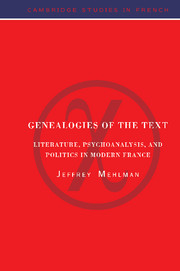Book contents
- Frontmatter
- Contents
- Acknowledgments
- 1 Introduction
- 2 Craniometry and criticism: notes on a Valéryan criss-cross
- 3 Literature and hospitality: Klossowski's Hamann
- 4 Literature and collaboration: Benoist-Méchin's return to Proust
- 5 “Pierre Menard, author of Don Quixote” again
- 6 Iphigenia 38: deconstruction, history, and the case of L'Arrêt de mort
- 7 Writing and deference: the politics of literary adulation
- 8 Perspectives: on Paul de Man and Le Soir
- 9 Prosopopeia revisited
- 10 The paranoid style in French prose: Lacan with Léon Bloy
- 11 The Holocaust comedies of “Emile Ajar”
- 12 Pour Sainte-Beuve: Maurice Blanchot, 10 March 1942
- 13 Flowers of evil: Paul Morand, the Collaboration, and literary history
- Appendix
- Notes
- Index
- Series list
6 - Iphigenia 38: deconstruction, history, and the case of L'Arrêt de mort
Published online by Cambridge University Press: 19 January 2010
- Frontmatter
- Contents
- Acknowledgments
- 1 Introduction
- 2 Craniometry and criticism: notes on a Valéryan criss-cross
- 3 Literature and hospitality: Klossowski's Hamann
- 4 Literature and collaboration: Benoist-Méchin's return to Proust
- 5 “Pierre Menard, author of Don Quixote” again
- 6 Iphigenia 38: deconstruction, history, and the case of L'Arrêt de mort
- 7 Writing and deference: the politics of literary adulation
- 8 Perspectives: on Paul de Man and Le Soir
- 9 Prosopopeia revisited
- 10 The paranoid style in French prose: Lacan with Léon Bloy
- 11 The Holocaust comedies of “Emile Ajar”
- 12 Pour Sainte-Beuve: Maurice Blanchot, 10 March 1942
- 13 Flowers of evil: Paul Morand, the Collaboration, and literary history
- Appendix
- Notes
- Index
- Series list
Summary
In the already considerable annals of the naturalization of recent French thought in this country, one of the most rewarding documents is a collective volume of 1979 entitled Deconstruction and Criticism. Its publisher, Seabury Press, billed the book as a “manifesto” of what has elsewhere been called the “Yale School”: Messrs. Bloom, de Man, Derrida, Hartman, and Miller telling it as it presumably never quite manages to be. The anthology, moreover, was originally conceived as a series of readings of Shelley's dense and elusive final fragment, “The Triumph of Life.” There was, I suspect, a measure of perfidy in that choice: the English poet falls into a “trance of wondrous thought” and enters into dialogue with his great French precursor, Rousseau. For Bloom, Rousseau plays Virgil to Shelley's Dante. And therein lay the trap; for Shelley ultimately supersedes Rousseau. Consider that scenario as the intertext of the anthology-manifesto: the “working through” of Derrida, exemplary reader of Rousseau, in English would take the form of allowing him to take his stand amid the enigmatic rhymes of Shelley's most problematic poem – smack in the land of Bloom. If there were ever terms on which the Frenchman (like Rousseau) might be superseded in and by English, these were they. The binding of the book, as if in anticipation, identifies the author as “Bloom et al.”
Derrida, in his shrewdness, was not about to fall into that trap, and his tack in retreating from – treating – Shelley's text lay in audaciously assuming as his own Rousseau's presumably imperfect English: “The Triumph of Life”? What if one were to hear “triumph” as the French verbal form: (ce qui) triomphe de la vie? As though the triumph of life might be appropriately (mis)read in French as a triumph over life
- Type
- Chapter
- Information
- Genealogies of the TextLiterature, Psychoanalysis, and Politics in Modern France, pp. 82 - 96Publisher: Cambridge University PressPrint publication year: 1995
- 1
- Cited by



